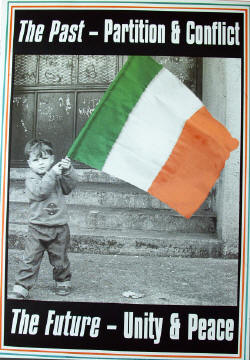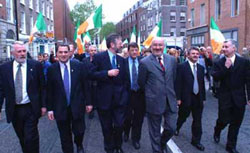 |
Irisch
Republikanische Solidarität
|
 |
Govt opposes public inquiry on bombings
The Irish Government is to oppose a full judicial inquiry into
the 1974 Dublin/Monaghan bombings, following publication of
the Barron report.
In his report, which took four years to compile, Justice
Barron found evidence of collusion by British forces in the
attacks, which were carried out by the unionist paramilitary
UVF.
Last night, Dublin government officials cited the possible
expense of a long-running public inquiry as a reason not to
openly investigate the deaths of 33 citizens in bomb attacks
on Dublin and Monaghan.
The Irish parliamentary Justice, Equality, Defence and Women's
Rights Committee is to hold its own hearings into the findings
produced for the next three months.
The committee will recommend whether an inquiry would "be
required, or fruitful", though it cannot compel witnesses to
attend, or make findings of fact.
The Minister for Foreign Affairs, Mr Cowen, has dodged
questions about the need for a public inquiry when he was
questioned in Dublin yesterday.
Meanwhile, members of the 1973/77 cabinet have remained silent
after the inquiry's sharp criticisms of their performance
following the bombings.
In his findings, Mr Justice Barron said the government had
shown "an apparent lack of interest" in tracking down the
bombers who killed 33 people, including a pregnant woman.
The surviving cabinet members, who were led by the taoiseach,
Mr Liam Cosgrave, will now be invited to make submissions to
the Justice Committee.
The committee has set a deadline of January 9th for receipt of
submissions, and it hopes to begin public hearings on January
20th with testimony from relatives of those killed and
injured.
Mr Greg O'Neill, the solicitor representing many of the
families, said a full public inquiry must now be ordered by
the Government into the atrocities and their aftermath.
However, he said he believed that a repeat of the lengthy
Saville inquiry, which is expected to cost #155 million
sterling to complete, could be avoided.
The Fine Gael/Labour Cabinet had moral obligations, he said:
"There was an amazing lack of commitment and follow-through
from people who went on television and said that it was an
unforgivable act and that no stone would be left unturned
until those responsible were brought to justice.
"We are simply not going to be bought off by saying that this
all happened a long time ago. It was not our fault," he said.
The families' group, Justice for the Forgotten, will review
its legal options over coming weeks, though it has not decided
to seek compensation from the Irish and British governments.
Letzte Änderung:
18-Dez-03